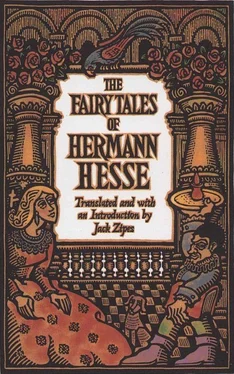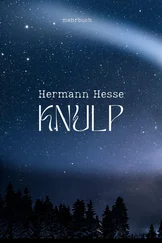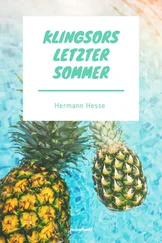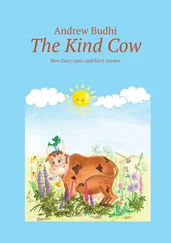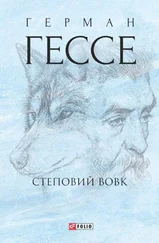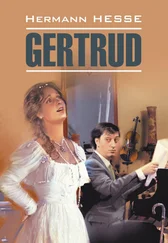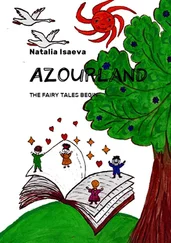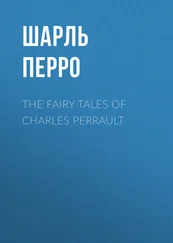Hermann Hesse - The Fairy Tales of Hermann Hesse
Здесь есть возможность читать онлайн «Hermann Hesse - The Fairy Tales of Hermann Hesse» весь текст электронной книги совершенно бесплатно (целиком полную версию без сокращений). В некоторых случаях можно слушать аудио, скачать через торрент в формате fb2 и присутствует краткое содержание. Год выпуска: 1995, ISBN: 1995, Издательство: Bantam Books, Жанр: Классическая проза, Сказка, на английском языке. Описание произведения, (предисловие) а так же отзывы посетителей доступны на портале библиотеки ЛибКат.
- Название:The Fairy Tales of Hermann Hesse
- Автор:
- Издательство:Bantam Books
- Жанр:
- Год:1995
- ISBN:9780553377767
- Рейтинг книги:5 / 5. Голосов: 1
-
Избранное:Добавить в избранное
- Отзывы:
-
Ваша оценка:
- 100
- 1
- 2
- 3
- 4
- 5
The Fairy Tales of Hermann Hesse: краткое содержание, описание и аннотация
Предлагаем к чтению аннотацию, описание, краткое содержание или предисловие (зависит от того, что написал сам автор книги «The Fairy Tales of Hermann Hesse»). Если вы не нашли необходимую информацию о книге — напишите в комментариях, мы постараемся отыскать её.
The Fairy Tales of Hermann Hesse — читать онлайн бесплатно полную книгу (весь текст) целиком
Ниже представлен текст книги, разбитый по страницам. Система сохранения места последней прочитанной страницы, позволяет с удобством читать онлайн бесплатно книгу «The Fairy Tales of Hermann Hesse», без необходимости каждый раз заново искать на чём Вы остановились. Поставьте закладку, и сможете в любой момент перейти на страницу, на которой закончили чтение.
Интервал:
Закладка:
If I ask myself what more do you expect from me, then I find the following: You expect that I, as writer, should finally show a minimum of heroism once and for all and reveal my colors. But my dear colleague, I have done this continually since 1914, when my first essay against the war led to my friendship with [Romain] Rolland. Ever since 1914 I have had those forces against me that seek to prohibit religious and ethical behavior (and permit the political). I have had to swallow hundreds of attacks in newspapers and thousands of hate letters since my awakening during wartime, and I swallowed them, and my life was made bitter because of this, my work was made more difficult and complicated, and my private life went down the drain. And I was not always attacked just by one side and then protected by another, but since I did not belong to any party, both sides liked to choose me as a target for their barrages. So, once again I am now being vilified simultaneously by the emigrants and the Third Reich. And I firmly believe that my place is that of the outsider and that of the man without a party, a place where I have my little bit of humanity and Christianity to show.
These views and many other reflections about art and education were incorporated into The Glass Bead Game , which was first published in Zurich in 1943 and subsequently in Germany in 1946. It was to be his last novel, and fittingly, it encompassed the wide range of issues that had been central to his writing since the turn of the century. The Glass Bead Game reads like an autobiographical novel of development. The young protagonist, Josef Knecht, is chosen to attend an elite school in Castalia, a province dedicated to intellectual and aesthetic pursuits. Like many of Hesse’s other young “heroes,” he must undergo an apprenticeship under the guidance of a wise man, in this case the Magister Musicae of Monteport, who teaches him to comprehend dreams and to embrace life’s opposites — to play with them and become one with them. Once Knecht has achieved everything he possibly can as the grand Magister Ludi in this spiritual realm, he decides that he wants to leave Castalia and make a more practical contribution in the outside world. He had been bothered by the esotericism and elitism of Castalia and felt that a Magister of his stature should assume more social responsibility. Knecht’s tragic death at the end of the novel reflects Hesse’s own ambivalent attitude toward the social commitment of the artist as well as his self-questioning position in regard to aestheticism. By contrast, Hesse never questioned the value of art as a means of maintaining social values and imparting wisdom against the barbarism of his times.
After World War II, Hesse’s own artistic productivity declined out of choice. He preferred to spend his time responding to demands from the outside world while trying to lead a “normal” private life. After 1945 Hesse had suddenly become famous and was sought out by critics, the media, and literary societies, not to mention numerous friends who could now travel freely in Europe. Nor could he avoid controversy. First came a difficult period in which it seemed that Hesse’s works might be banned by the American occupying forces simply because they had not been banned by the Nazis. This censorship never occurred, and Hesse wrote numerous political essays about the necessity for moral regeneration in Germany and for overcoming the militaristic mentality. Four of his most important essays of the immediate postwar period were later published in War and Peace (Krieg und Frieden) in 1949.
Hesse always suspected that his admonishments would not be taken seriously in Germany. Immediately following the war, however, he was so disappointed and embittered by the continuation of certain forms of fascist and materialist thought in Germany and by his disputes with the Allied authorities that his nerves became frayed. Even though he received the Goethe Prize in 1946, followed by the Nobel Prize, also in 1946, he became so depressed that he again withdrew to a sanatorium for treatment. Only in March 1947 did he feel sufficiently healthy to return to Montagnola, where he spent the last fifteen years of his life following his artistic pursuits and nursing his frail health.
Although many writers, politicians, and friends called upon Hesse to take an active role in politics in the name of peace, he continued to refuse to commit himself to any one party, country, or ideology. In reviews, essays, and letters, he wrote about both the dangers of American capitalism for Europe — what he called the Americanizing of Europe — and the totalitarian threat of the Soviet Union. It was clear that his non-involvement had a great deal to do with his “politics” of nonviolence. Hesse refused to compromise his integrity or support causes that might be manipulated for nefarious ends. Humanity came first for him, not a political party or movement, and he believed peace could be achieved only if people were given freedom to realize their humanitarian impulses.
As the cold war escalated in the 1950s, Hesse withdrew from the world’s stage and kept his opinions to himself. Except for writing some short stories, he spent most of his time painting, maintaining a vigorous correspondence, and fighting various debilitating illnesses. He had always suffered periodic spells of depression and physical exhaustion; after 1950 his eyes began to weaken, and in 1955 a heart condition prevented him from leaving the area around Montagnola. At about this time the doctors discovered he was suffering from leukemia, which became virulent at the end of 1961. Thanks to blood transfusions, he was able to live fairly comfortably until his death on August 8, 1962.
In many respects Hesse’s great achievement as a writer was in the domain of fairy tales and fantasy literature. He wrote his very first fairy tale, called “The Two Brothers” ( “Die beiden Brüder” ), when he was only ten years old, and his first significant period as a writer, 1895–1900, was a time when he immersed himself in reading and emulating European and Oriental fairy-tale writers. Like no other writer of the twentieth century, all of Hesse’s works drew in some way on the great fairy-tale traditions of Europe and the Orient. He was most successful as a writer when he combined different traditions with his own personal experiences and endowed them with an unusual lyrical and sometimes sentimental but nonetheless strong note of refusal.
Hesse was the fairy-tale writer of the “modern romantic” refusal par excellence, a notion conceived by the philosopher Herbert Marcuse to indicate the resolute unwillingness of individuals to yield to social and political forces that tend to instrumentalize them and make them into objects of manipulation. Hesse’s heroes refuse to comply with the norms of bourgeois life, and they reject the hypocrisy and superficiality of European society corrupted by materialism. They are loners, rebels, poets, intellectuals, painters, and eccentrics who represent the soul of a humanitarian tradition under siege. It was in order to commemorate the struggles of such marginal types who survive on the fringes of society, alienated by the increase of industrialization and capitalism, that Hesse experimented with the fairytale genre. Like his characters, he was tormented by arbitrary social codes, the rigid Manichaean principles of the Judeo-Christian tradition, and the onslaught of technology.
It is possible to consider Hesse’s tales in chronological order and demonstrate how each reflected a phase of his own life and how each of his protagonists was a variation of his own personality. Such an approach to his fairy tales, though defensible and valid, would do these works an injustice, however. Hesse was a remarkably conscious artist who used fairy-tale conventions to gain distance from his personal problems. He found the symbolic forms, motifs, and topoi useful for generalizing his experiences and endowing them with multiple meanings through plots reminiscent of ancient Oriental and German romantic tales.
Читать дальшеИнтервал:
Закладка:
Похожие книги на «The Fairy Tales of Hermann Hesse»
Представляем Вашему вниманию похожие книги на «The Fairy Tales of Hermann Hesse» списком для выбора. Мы отобрали схожую по названию и смыслу литературу в надежде предоставить читателям больше вариантов отыскать новые, интересные, ещё непрочитанные произведения.
Обсуждение, отзывы о книге «The Fairy Tales of Hermann Hesse» и просто собственные мнения читателей. Оставьте ваши комментарии, напишите, что Вы думаете о произведении, его смысле или главных героях. Укажите что конкретно понравилось, а что нет, и почему Вы так считаете.
